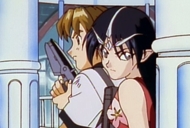
Crest of the Stars
I've written myself into the ground about how things have changed in the anime world over the last dozen years; there's really no need to repeat myself. However, it is fascinating to complete a series you started a decade ago and revisit your initial thoughts. When it was released, Crest of the Stars was a complete surprise...intriguing and engaging in ways most sci-fi anime most definitely weren't. The opening episodes were character-driven. The plot took a back seat to its young leads. But times have changed and our expectations on how anime is supposed to look have gone through the roof. Can shows made around the turn of the millennium still hold up?
Based on Crest of the Stars, my vote is yes. While it simply doesn't look very pretty now -- even if it ever really did -- the personal hooks and unexpected relationship developments still work. Crest of the Stars has a few flaws that appear past the first set of episodes, but they aren't enormous. In an era when every sci-fi flick has to have massive destruction and universe-changing consequences, it's still a blessing to watch something unique, where wall-to-wall explosions are eschewed for a more intimate story. (While I've stolen bits and pieces from my original review for this one, you can find it here to see a little of my history with the series.)
The alien Abh have surrounded Martine, a dead ringer for Earth. Within hours, Martine's government concedes surrender -- and the head of the administration, Rock Lin, makes a fateful agreement with the Abh to keep his post under their authority. As such, his son, Jinto Lin, becomes nobility within the Abh class structure. Jinto, a young child when this happens, leaves Martine to learn the Abh language and basics of the culture. Soon after, we meet him as a young man of 17, headed to Abh military training so he can retain his title and eventually take over his father's position.
On the first leg of his journey, he makes the acquaintance of the sweetly mysterious Lafiel, the first genuine Abh he's ever actually met -- since the Abh prefer to let their conquered worlds rule themselves, it's rare to see one in the outskirts of their galactic holdings. In their short time together, they quickly become friends. A collective of worlds have joined together against the Abh, though, and the opening salvo of that war sends Lafiel and Jinto on an unexpected journey. It's Lafiel's job to get Jinto safely to his post...but they'll have to travel through hostile and traitorous territory to reach their destination.
In my original review, I noted that the early episodes of Crest of the Stars reversed our expectations of what a sci-fi series could and should be. Instead of immediately giving us a war, we get a lot of universe-building done on a personal scale. We get a detailed and complex portrait of an alien race, and the nuances go far beyond just a written language. The Abh are as rich a culture as Klingons or Vulcans, with certain defining characteristics but a diversity that's surprising. Along the way, we find that the Abh are deeply intelligent, reasonably moral, yet arrogant in the way only truly assured people confident in their social standing can be.
Lafiel is the most obvious example of how the Abh can't be pigeon-holed. While she is spritely and playful at first with Jinto, when duty calls, any sense of romantic entanglement goes out the window for her -- much to Jinto's chagrin. She's neither a prize to be won nor a man-hating tantrum. She's a young woman who must see to Jinto's survival, and that's what her focus becomes. At first, it's easy to think that her personality has shifted from the kind individual we met at first. But pay close enough attention, and we realize that her sense of pride and duty have overriden any personal feelings or agendas.
Many other players in the series turn out to be more than what they might seem. Vassals that provide a minor amount of cheesecake wind up having minds of their own, not submitting blindly to their master. People on the fence about the Abh and the obvious war to come have their own viewpoints, but they can change and grow over time. If there's a fault in this approach, it's that a couple of textbook villains in the piece look stock and perfunctory by comparison to the other members of the cast.
That's the only other place I'd really ding Crest of the Stars -- parts of the plot simply aren't worthy of the characters or the time spent on them. A slow, talkative series, nothing happens quickly in Crest of the Stars, so when the plot fails to be imaginative here and there, we're stuck in that narrative hiccup for a while. This is most notable when our twosome get stuck under the aegis of a minor count desperate to hold onto his corner of the universe. There are very clever bits; I enjoyed one segment where Lafiel has to puzzle her way through a conversation with a computer that doesn't want to give her the bits of information she needs. But by time that storyline is done, I felt it had taken too long. It doesn't make or break the show, but had the narrative been as inventive as the world creation, Crest of the Stars would still be making waves.
Really, those are minor niggles in a program well worth investing some time to see. So many bits defy anime conventions. The vast majority of battles aren't fought staring out windows with ships screaming by each other firing a thousand laser cannons; instead, they play out on small monitors where a blip that's disappeared means a vessel and its crew have passed into oblivion. And yet there's significant tension around those blips on a screen. Action freaks might pass out from boredom, but I appreciated the fresh take. And for those who are patient, the grand finale is as exciting as you could hope for, with a great denouement that leads into the next series, Banner of the Stars.
In other areas of importance...I'm not sure what I was thinking when I wrote about the animation quality of Crest of the Stars twelve years ago. It isn't bad, but it looks aged. It's never an eyesore, but it's one of those anime where the visuals aren't exactly the point. They tell the story effectively, but nothing more. The thing that still shines is the soundtrack, which on the whole is brilliant. A couple of choices in early episodes don't ring true, but most of it is perfect, and I couldn't help but watch the opening every single time just to hear the beautiful orchestral theme. It could easily stand as one of my favorite anime scores.
While Crest of the Stars ends well, there's a lot more story to be told, and I'm looking forward to sticking Banner of the Stars in the Blu-Ray player soon. It's a treat to return to a show that really is as unique as you once imagined, even if the look has lost a little of its luster. While the elongated middle drags the show down just a little in its letter grade, consider it a full A if you have forgiving eyes toward older animation and a soft spot for sci-fi that's more cerebral than your average anime.
P.S. Unless you want to make your ears bleed, avoid the dub. It was bad in its day, and it's all but unlistenable now. It's not "so bad it's good"...it's so bad that it could permanently harm young puppies. You don't want that, now, do you?
Crest of the Stars -- violence, brief language, brief non-sexual nudity -- A-

